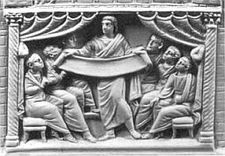Marcion
Marcion of Sinope (Sinope, Pontus, h. 110- c. 160) was a writer and religious leader; He stood out as a Christian heresiarch of the second century, founding Marcionism and preaching in it a dualistic religiosity of a proto-Gnostic nature. His doctrine is summed up in the existence of a true God, unknown and alien to the world, revealed by Jesus, who was opposed by an inferior being, the Demiurge, whom he identifies with the god of the Jews. He claimed that the Mosaic Law was imperfect and contrary to the teachings of the gospel.He therefore rejected the Old Testament, and from the New he only accepted the Gospel according to Saint Luke, without the stories of childhood, and the epistles of Saint Paul.
Life
He was the son of a Bishop of Pontus and amassed a considerable fortune through his activities as a shipowner. According to an account by Epifanio that is considered unreliable, he was excommunicated by his father for seducing a virgin. In any case, he left Sinope and traveled to Rome probably around 140, with the idea of intervening in the propagation of the faith. After having doctrinal disagreements with the presbyters of the church of Rome, he caused a schism and organized his own church. The break with the church of Rome occurred in 144. It is probable that he later returned to Asia Minor and spread his doctrine in this area.
Tertullian mentions that at the end of his life he converted and promised to bring his followers back to orthodoxy, a task that was prevented by death. After his death his ideas spread widely both to the East and to the West. West. In the East his influence can be detected up to the 10th century.
Teachings
Marcion was a big fan of Paul, and as a Greek, he didn't understand that Christianity had a Jewish connection. He considered the Septuagint Version inauthentic and without authority. Influenced by the teachings of the Gnostics, specifically by that of Cerdón, of whom it is said that he was a disciple together with Valentine in Rome, he conceived a new way of understanding Christianity.
Supporter of a cosmology and a theology structured in the opposition of the Good God, who lives in the supreme heaven and the Just God, who is inferior to the previous one. The Just God is the creator and owner of the world and would coincide with the God of the Old Testament. For this reason, he flatly rejected the Old Testament, since it spoke of a bloody and vengeful God, responsible for evils and wars, and proposed that the Creator God was not the same as the Father God of Christ (a doctrine that is a form of of dualism). He rejected the use of fear of God to enforce obedience. He relied only on love as the support of ethics.
The God of the Old Testament is contrasted with the coming of Jesus Christ, who has replaced the law with love and has removed human souls from the power of the creator God.
He wrote a first canon, in which he included only the writings of Paul, leaving only some epistles as authentic (he removed the epistle to the Hebrews and the so-called pastoral ) and the Gospel according to Saint Luke (without the first two chapters). After this canon, orthodox Christianity realized that it was necessary to organize the tangle of writings that had been produced since the origin of Christianity and published its own canon, which became what we know today as the New Testament.
According to an ancient text, Marcion said that the Demiurge stole luminous elements from the real world, and with them created the physical universe we know. Due to the general belief in the proximity of the parousia, he did not believe in marriage and understood that procreation was an invention of the wicked God of the Old Testament.
None of his writings have been found and everything that is known about him has come from other authors of the time such as Tertullian and Irenaeus, who condemn him. However, there are news of at least two texts, one known as Antithesis (contradictions between the Old and New Testaments), and the other his version of the Bible.
It is considered the greatest danger that primitive Christianity suffered, because it was highly organized and had a lot of money to preach its teachings.
Contenido relacionado
VI millennium BC c.
Therese of Lisieux
Parcel
